
The Most Important Problems of Turkey are Economy and Terror
The 2019 results of Kadir Has University´s ´Social and Political Trends in Turkey´ research that has been conducted for 10 years, revealing the public impulses, were announced on January 15th.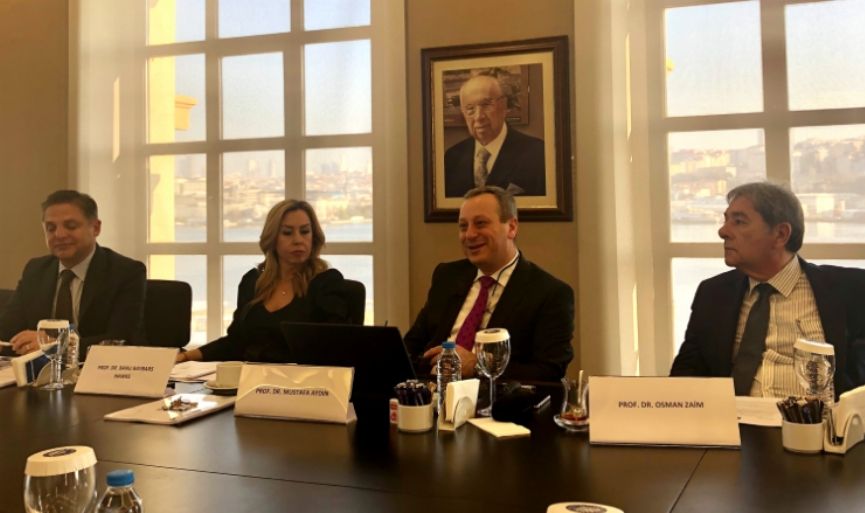
Translation by Janet Mitrani
The research shedding light on the last 10 years of the country, shows that according to the public the most important problems in Turkey are economy and terror. Where America and Israel are the first two countries in threat perception, Azerbaijan and the Turkish Republic of Northern Cyprus (TRNC) are defined as friends.
The 2019 results of Social and Political Trends in Turkey research, that has been conducted since 2010, by an academic team coordinated by Prof. Dr. Mustafa Aydın, revealing the public opinion of Turkey's agenda and probable problems in the future, were announced during a meeting in Kadir Has University. According to the results of the survey conducted between the dates November 25 and December 13, 2019, among 1000 people aged 18 and over, residing in the city centers of 26 cities, the public sees economy (41.6%) and terror (19.8%) as the most important problems of the country.
The most trusted institution is TSK (Turkish Armed Forces), the least trusted institution is media
According to the results of the survey, among the most trusted institutions in Turkey, the Turkish Armed Forces came first. The first three are the security forces; Turkish Armed Forces (60.6%), gendarmerie (59.8%), police (56.8%), followed by the presidency (49.8%) and MIT - The National Intelligence Organization (47%). The least trusted institutions are respectively the media (41.9%), jurisdiction (43.2%), Presidency of Religious Affairs (43.3%).
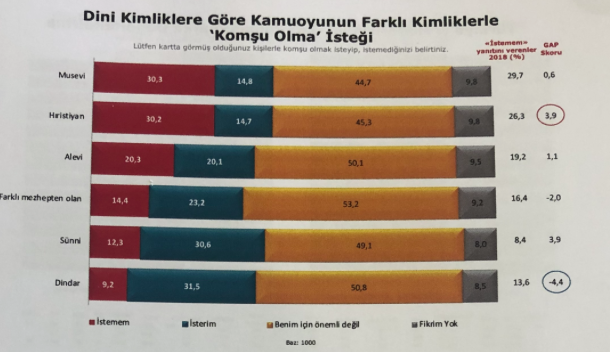
Rich-poor is added to the polarization
It seems there are no conclusions as to whether there is political polarization, the results are fairly close (50.8% - 49.2%). When we glance at the axis of the polarization, as an addition to the traditional secular-religious and right-left distinction, the ratio of the people who think there is a rich-poor distinction (20.5%) has increased due to economic problems.
The ratio of the people who think that there is a politicization of the judiciary system increased per last year. Where 30.7% of the respondents think that democracy is weakening in Turkey, 29.8% defined Turkey as in the process of democratization.
4.4% can save money
According to the results, 46.5% said the economy is worsening, 19.4% said they haven't felt any change. The ratio of the people who feel worse economically per 2018 was 57.1%. Unemployment is listed as the first among the economic problems, followed by inflation and the increase in food prices. The ratio of the people who can save money is rather low; 4.4%. People who cannot save money in the least bit is 72.3%. The economists will not like the answer given when asked, "What do you do with your savings?; 44.6% said gold, 24.5% said foreign currency, 20.3% said interest, 29% said, "I keep it at home". These answers show distrust.
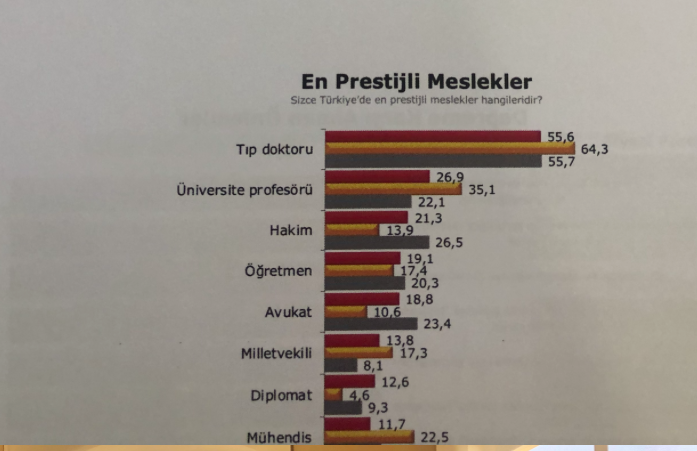
The most prestigious jobs
Enemy USA and Israel, friend Azerbaijan and TRNC
Survey results show that people who think that the government has a successful foreign policy has decreased per last year to 28.5%. The USA is once again the first in the countries perceived as a threat to Turkey. Following the USA (64.5%) respectively, is Israel (55.6%), England (49.2%), France (49%), and Syria (47.9%).
Countries perceived as friend are Turkic republics and the Turkish Republic of Northern Cyprus. EU membership (51%) and NATO membership (54.8%) are supported but people who think it is possible for Turkey to become an EU member is only 29%.
Syrians are not wanted
The ratio of the people who are not happy with the Syrians is 59.8%. The reasons for discontent are the negative perceptions of Syrians; that they are prone to crime, disturbing the public peace, cheap labor, disturbing the national identity. Where 70.9% of the respondents state that they don't believe the Syrians will be sent back to their countries, 86.1% stated that they will not let a Syrian work for them.
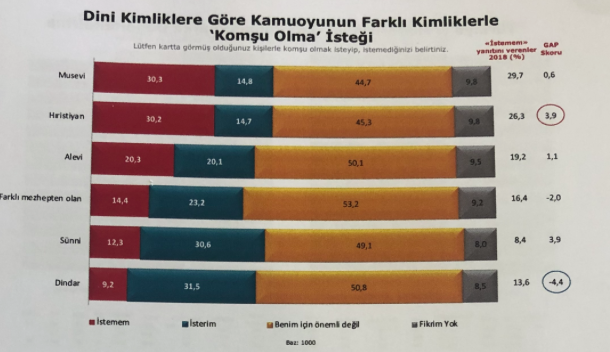
We don't even want to be neighbors with the 'different other'
As per ethnic identities, Armenian (36.3%), Greek (29.8%), Arab (21.5%) neighbors are not wanted. As per religious identities, Jewish (30.3%), Christian (30.2%), Alevi (20.3%) neighbors are not wanted. When social identities are in question, among the people that are not wanted as neighbors, (46.5%) and refugees (43.3%) come first. Likewise, people don't want their children to get married to a non-Muslim (26.8%), other nationality (18.5%) and a refugee (14.9%).
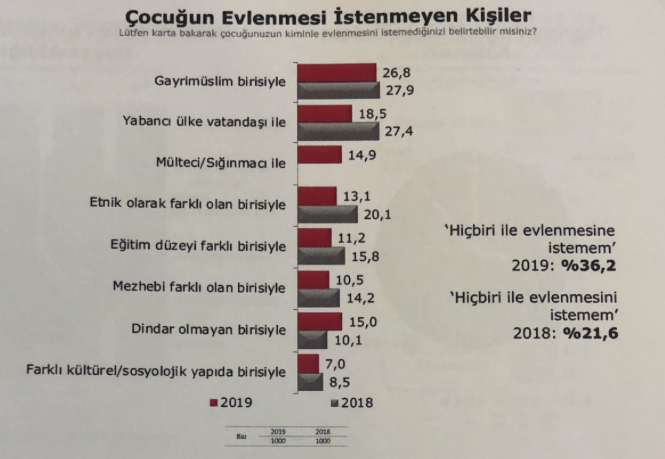
We don't read books, we don't go to the theater, movies
Although the ratio of the people going to the movies, soccer games, exhibitions, and concerts have increased per last year, it is still rather low. 50.9% didn't read a book in 2019. 38.3% didn't go to any movie, 73.5% didn't go to any theater. However, time spent watching TV or on social media is rather high. People who are spending 5 hours or more in a day on social media or with computer games have doubled per 2018 to 9.4%. The ratio of people who are reading newspapers online has increased to 42%.
Are we happy?
To the question "Are you happy living in Turkey?", where 46% of the respondents answered they were either 'very happy' or 'happy', 15% (same as 2018) answered they were 'very unhappy'. The reasons of the respondents who answered as "I prefer living abroad", are listed respectively as living conditions (35.8%), economy (20.1%), value rights and freedom (14.2%).
Related Newsss ss









